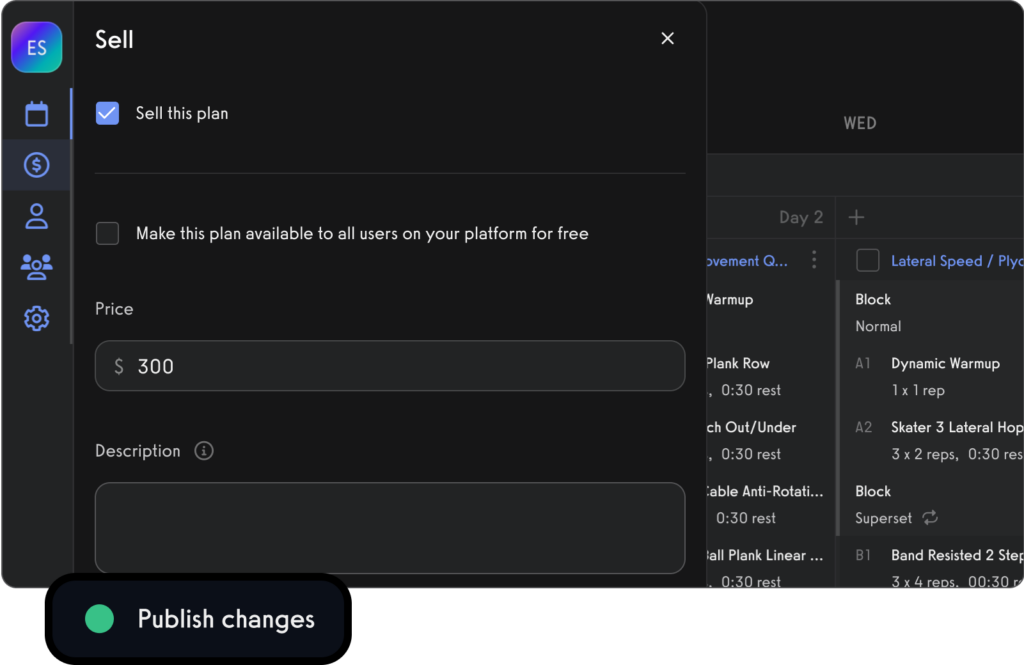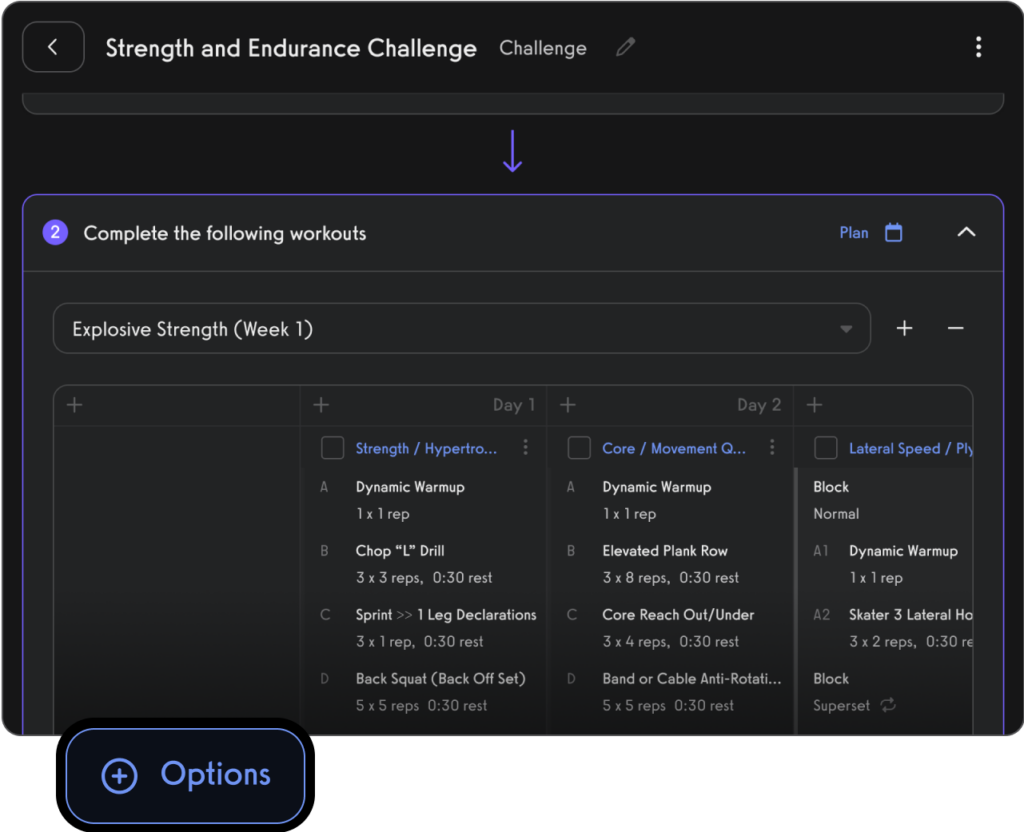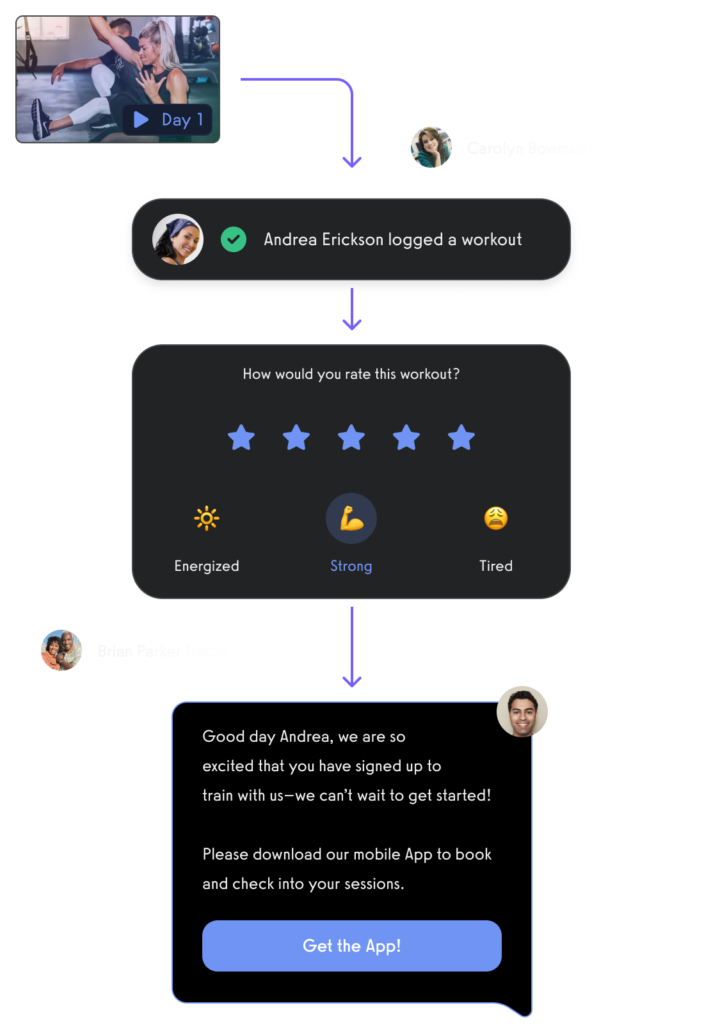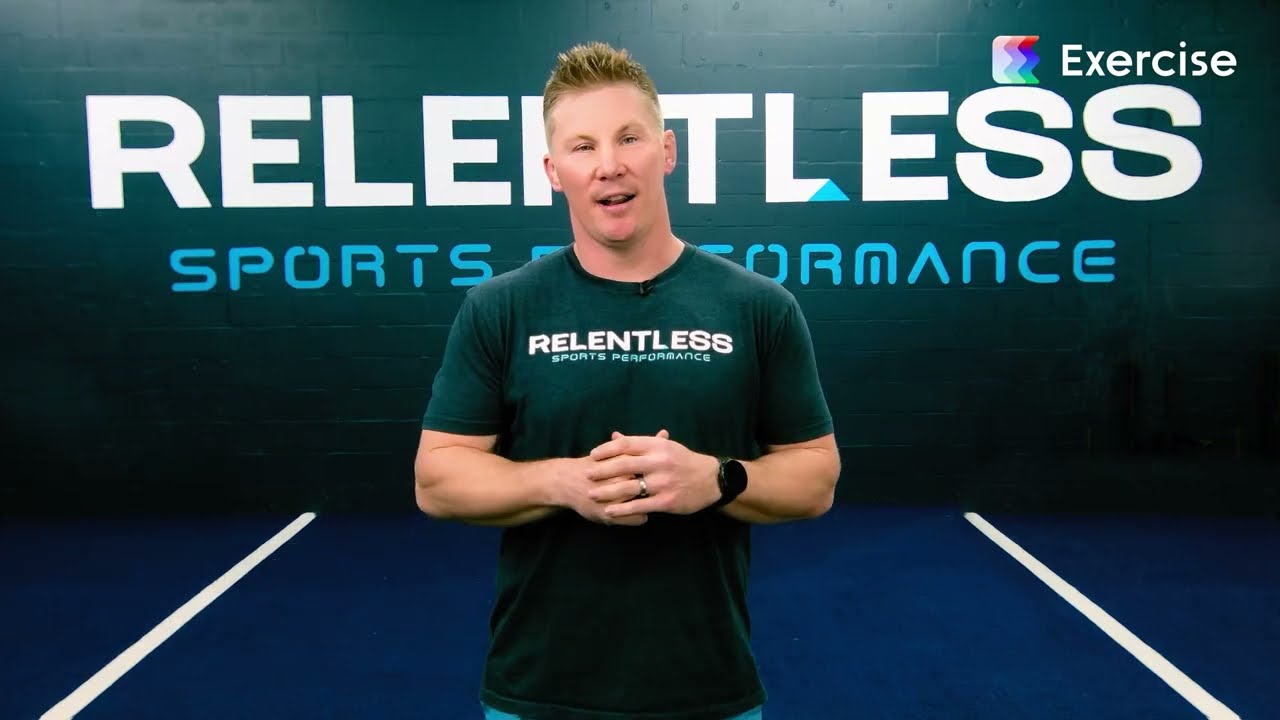Can you sell workout plans without being certified?
Yes, you can sell workout plans without being certified, but having a certification enhances credibility and ensures that you’re providing safe and effective workouts.

You do not need to be certified to sell workout plans, you don’t need a degree to be a personal trainer, and you technically don’t need to be certified to be a personal trainer, but it is highly recommended in order to establish credibility and gain opportunities for employment or partnership in the fitness industry.
With Exercise.com, you do not need to be certified to start making money selling workout plans online right away. Of course, if you want to become a certified personal trainer, then you can prominently display your certifications, design workout plans, and sell them seamlessly, propelling your fitness business to success.
Here are some of the best personal trainer certifications online and the easiest personal training certifications online to give you more credibility:
There are many ways to make money with fitness, and learning how to make money as an online fitness coach is great because becoming an online fitness coach and starting an online personal training business can be one of the highest paying fitness careers, especially if you can learn how to get high-paying fitness clients that will pay a premium price for your fitness coaching.

Exercise.com is a comprehensive platform with the best fitness software for influencers, the best personal training software, and the best gym management software so no matter what type of fitness business you have, it simplifies the process and amplifies your earning potential while also helping you run fitness challenges, create online workout groups, do fitness livestreaming, do in-person and online training, and more, all through your own custom-branded fitness apps.

Run online fitness challenges.

Create and sell fitness memberships, products, and digital offers.

Manage, message, and market to your leads and followers.

All from your very own custom branded fitness apps that can help you run your online fitness coaching business from anywhere. See why the best apps for online fitness coaches can help you scale.

With the ability to create, market, and sell workout plans online to a vast audience, Exercise.com can help transform your fitness passion into a lucrative online business. Learn how to make money selling workout plans online and explore the best apps for selling workout programs online.

Understanding the importance of certification in the fitness industry
In the digital age, it has become easier than ever to monetize your passion for fitness and health. One avenue that has gained popularity is the selling of workout plans online. While it may seem like an easy way to make money from fitness, one question that arises is whether you can sell workout plans without being certified. This article aims to provide answers and insights to help you make an informed decision.
Fitness certifications are typically offered by reputable organizations that provide education and training for fitness professionals. These certifications are an indication that a trainer has completed the necessary coursework and has demonstrated their knowledge through examinations. Certifications vary from general certifications that cover basic fitness principles to specialized certifications that cover specific areas such as yoga or strength training.
One of the reasons why certification is important is to ensure that trainers have the necessary knowledge to provide safe and effective training for their clients. By seeking certification, trainers show their dedication to their profession and their clients.
Read More:
- Best Apps to Sell Workout Programs Online
- How to Sell Fitness Online
- Best Fitness Products to Sell Online
- How to Create a PDF Workout Program Online
Legal aspects of selling workout plans without certification
While it may be possible to sell workout plans without certification, it is important to understand the legal risks involved. In the United States, there are no federal regulations requiring fitness professionals to hold certifications. However, most states have their own regulations, and some require certification or licensure for personal trainers.
It is important to note that certification is not just a legal requirement, but it also ensures that you have the necessary knowledge and skills to provide effective training and advice. Certification programs cover topics such as exercise science, anatomy, and nutrition, which are essential for developing safe and effective workout plans. You can also use personal trainer workout plan templates as a starting point to creating effective workout plans.
Potential liabilities and risks
By selling workout plans without certification, you may expose yourself to potential legal liabilities if a client suffers an injury resulting from your advice or recommendations. This could lead to lawsuits, medical expenses, and reputational damage. By not having a certification, it may be difficult to prove that you have the knowledge and skills necessary to provide effective training and advice.
For example, if you provide a client with a workout plan that includes exercises that are too advanced for their fitness level, they may suffer from injuries such as muscle strains or sprains. In this case, the client may hold you responsible for their injuries and may seek legal action against you.
Protecting yourself and your clients
To protect yourself and your clients, it is advisable to seek certification that covers your area of expertise. This will not only give you the necessary knowledge and skills but also provide you with insurance coverage in case of any mishaps. Additionally, it is important to have a signed waiver that outlines the potential risks of your clients’ specific fitness program before you begin working with them.
It is also important to stay up-to-date with the latest research and trends in the fitness industry. This will help you provide your clients with the most effective and safe workout plans. Attending workshops, conferences, and other educational events can help you stay informed and improve your skills.
Furthermore, it is important to develop a good relationship with your clients and communicate with them regularly. By understanding their fitness goals, limitations, and preferences, you can tailor your workout plans to their specific needs and reduce the risk of injuries.
In conclusion, while it may be possible to sell workout plans without certification, it is not advisable. Certification not only protects you from legal liabilities but also ensures that you have the necessary knowledge and skills to provide effective training and advice. By taking the necessary steps to protect yourself and your clients, you can build a successful and reputable career in the fitness industry.
Read More:
- How to Make Money Selling Workout Plans Online
- How do you make a workout program and sell it?
- Best Workout Plan Sales Software
Alternatives to selling workout plans without certification
If you are not certified, there are still other ways to benefit from the fitness industry without putting yourself and others at risk. Here are some alternatives:
Partnering with a certified professional
Partnering with a certified fitness professional who complements your skills and services can be a great way to offer your clients a more comprehensive and safe wellness experience. By combining your expertise and knowledge, you can create a unique and effective fitness program that meets the needs of your clients.
For example, if you are a yoga instructor who wants to offer strength training to your clients, you could partner with a certified personal trainer who can help you design a safe and effective strength training program. This way, you can offer your clients a well-rounded fitness experience without compromising their safety.
Offering general fitness advice instead of personalized plans
If you do not have a certification, it may be best to offer general fitness advice instead of offering personalized plans. By providing general fitness advice, you can still share your passion for fitness while avoiding the risks associated with creating specific fitness plans.
For instance, you could write a blog or create social media content that provides tips and advice on how to stay fit and healthy. You could also create workout videos that demonstrate different exercises and routines that anyone can do at home.
Read More: How to make money selling fitness?
Pursuing a certification to enhance your credibility
If you want to pursue a career in the fitness industry, it is advisable to seek certification. This will help to enhance your credibility, knowledge, and skills, which can lead to better job opportunities, more clients, and higher pay.
There are many different certifications available, depending on your interests and goals. For example, you could become a certified personal trainer, group fitness instructor, yoga instructor, or nutritionist. Each certification requires a different amount of time and effort, but they all offer valuable knowledge and skills that can help you succeed in the fitness industry.
Moreover, pursuing a certification shows your commitment to the industry and your clients. It demonstrates that you take your job seriously and are willing to invest time and effort to improve your skills and knowledge.
In conclusion, while selling workout plans without certification may seem like a quick and easy way to make money, it can put you and your clients at risk. Instead, consider partnering with a certified professional, offering general fitness advice, or pursuing a certification to enhance your credibility and knowledge.
Marketing your workout plans without certification
Marketing your services without a certification can be challenging, but there are strategies you can use to increase your visibility and credibility. Here are some tips to help you market your workout plans without certification:
Emphasizing your personal fitness journey and results
If you have achieved significant fitness results personally, sharing your journey can help to increase your credibility and show potential clients that you have the necessary passion and experience to help them reach their fitness goals. For example, you could share how you transformed your body from being overweight to fit, or how you overcame an injury through exercise and nutrition. People are often inspired by stories of others who have achieved success, and your personal journey can be a powerful tool in attracting clients.
In addition to sharing your story, you could also provide details about the specific workouts and nutrition plans that helped you achieve your results. This can help potential clients understand your approach and give them confidence in your ability to help them reach their goals.
Building trust through testimonials and social proof
Having testimonials from satisfied clients can help build trust with potential clients. You could ask your current or past clients to write a short testimonial about their experience working with you and how you helped them achieve their fitness goals. These testimonials could be displayed on your website or social media pages.
Additionally, using social proof, such as sharing before and after pictures of clients, can also help to enhance your credibility. People are often motivated by seeing real-life examples of others who have achieved success, and seeing the physical transformations of your clients can be a powerful tool in attracting new clients.
Utilizing social media and content marketing to showcase your expertise
Creating quality content on social media and other platforms can help to showcase your knowledge and expertise, which can in turn help to attract more clients. You could create blog posts, videos, or infographics that provide valuable information about fitness and nutrition. This content could cover topics such as how to build muscle, how to lose weight, or how to stay motivated to exercise.
Additionally, using influencer platforms can help you to reach a wider audience. You could partner with other fitness influencers or bloggers to promote your workout plans and reach new potential clients. By showcasing your expertise and providing valuable content, you can establish yourself as a trusted authority in the fitness industry, even without a certification.
The pros and cons of selling workout plans without certification
While it may be possible to sell workout plans without certification, there are both pros and cons to consider. Here are some:
The benefits of operating without certification
One of the benefits of operating without certification is the freedom to design your own programs and charge for them. This allows you to create unique and personalized workout plans that cater to the needs and preferences of your clients.
Another advantage is the ability to work remotely without the need for certification or licensing. This means you can offer your services to clients from all over the world without being restricted by geographical boundaries.
Furthermore, you don’t need to pay certification fees or spend time studying and taking tests. This can save you a significant amount of money and time, which you can use to improve your business in other ways.
The potential drawbacks and limitations
However, selling workout plans without certification also comes with potential drawbacks and limitations. One of the biggest risks is the increased liability if a client is injured while following your program. Without certification, you may not have the necessary knowledge and skills to ensure the safety of your clients.
Another limitation is the limited credibility and difficulty in attracting clients. In the fitness industry, certification is often seen as a mark of professionalism and expertise. Without it, you may struggle to convince potential clients to trust you with their health and fitness goals.
Finally, without certification, you may be unable to provide personalized advice and programs. Certification programs often teach trainers how to assess their clients’ needs and create customized workout plans based on their goals, fitness level, and medical history. Without this knowledge, you may be limited to offering generic workout plans that may not be effective for all clients.
Overall, selling workout plans without certification can be both beneficial and challenging. It’s important to weigh the pros and cons carefully and make an informed decision based on your goals, skills, and resources.
Read More:
- Best Fitness Software for Influencers
- Best Fitness Influencer Apps
- How to Make Money Selling Workout Plans Online
Getting Started Selling Workout Plans
While it may be possible to sell workout plans without certification, it is important to consider the potential risks involved. Seeking certification can help to increase your credibility and provide you with the necessary knowledge and skills to provide safe and effective training to your clients. However, if you choose to operate without certification, it is important to understand and mitigate the potential risks.
Ultimately, the choice to sell workout plans without certification is up to you. By weighing the pros and cons and considering your goals and values, you can make an informed decision that is right for you and your clients.

What is a fitness certification?
A fitness certification is a credential earned by fitness professionals who demonstrate their knowledge and expertise in a specific area of fitness. It may cover topics such as anatomy, exercise programming, client assessment, nutrition, safety, and ethics. Some of the most recognized certifying bodies include the National Academy of Sports Medicine (NASM), the American Council on Exercise (ACE) and the International Sports Sciences Association (ISSA).
There are many different types of fitness certifications available, each with its own unique requirements and focus. For example, the NASM Certified Personal Trainer certification focuses on corrective exercise and functional movement, while the ACE Personal Trainer certification emphasizes behavior change and motivational interviewing.
Additionally, some certifications are recognized by specific industries or organizations. For example, the NSCA Certified Strength and Conditioning Specialist certification is recognized by the National Collegiate Athletic Association (NCAA) and the National Basketball Association (NBA).
Why is certification important for credibility and safety?
Certification is a mark of credibility and safety for fitness professionals. It ensures that trainers have the knowledge to provide effective and safe training to their clients, reducing the risk of injury. Additionally, certification can give trainers the confidence to deliver quality services to their clients, which can lead to better results and a more satisfying experience.
Furthermore, certification can also open up career opportunities for fitness professionals. Many employers require or prefer that their trainers hold a certification, and some certifications may be necessary to work in certain settings such as hospitals or rehabilitation centers.
It is important to note that certification is not a guarantee of quality. While it is a good starting point, trainers should also continue to educate themselves and stay up-to-date on the latest research and trends in the fitness industry.
Certification is an important aspect of the fitness industry that helps ensure the safety and effectiveness of training programs. By earning a certification, fitness professionals demonstrate their dedication to their profession and their clients, while also opening up career opportunities and enhancing their credibility.
Is it legal to sell workout plans without being certified?
Yes, it is legal to sell workout plans without certification. However, while it’s legal, having a certification enhances your credibility and equips you with the necessary knowledge to create safe, effective workout plans. Exercise.com supports both certified and non-certified fitness enthusiasts in creating and selling workout plans, but certification adds professionalism that clients look for.
What are the risks of selling workout plans without certification?
The primary risk of selling workout plans without certification is providing advice that could potentially harm clients or be ineffective. Certification programs provide essential training to ensure your recommendations are both safe and effective. Without certification, gaining client trust may also be more challenging, as many people seek qualified trainers. Exercise.com helps mitigate these risks by offering comprehensive tools for managing and delivering high-quality workouts.
How can I improve my knowledge without certification?
You can enhance your fitness knowledge through online resources, books, seminars, and hands-on experience. Exercise.com also provides robust tools and resources that help both certified and non-certified individuals design professional workout plans. However, certification is strongly recommended for building expertise and credibility.
Do clients expect fitness professionals to be certified?
Yes, many clients expect fitness professionals to be certified as it reflects professionalism and expertise. Certification reassures clients that your workout plans are safe and effective. While some clients might not insist on it, having a certification can significantly boost your credibility and attract a wider client base. Exercise.com helps certified professionals showcase their qualifications while managing their business efficiently.
Can I get certified later while selling workout plans?
Yes, you can start selling workout plans and choose to pursue certification later. Many fitness professionals begin their careers this way, building their client base while working towards certification. As your business grows, gaining certification will further enhance your skills and credibility. Exercise.com provides the tools you need to manage and scale your business, certified or not, but certification will ultimately make your service more competitive.
Can Exercise.com help me sell workout plans if I’m not certified?
Absolutely. Exercise.com supports both certified and non-certified individuals in creating and selling workout plans online. However, we encourage all fitness professionals to pursue certification and ongoing education to ensure they provide the best, safest service possible to their clients. Certification also helps establish trust and long-term business growth.
Read More:
- Best Apps to Sell Workout Programs Online
- How to Sell Fitness Online
- Best Fitness Products to Sell Online
What type of fitness certification should I get?
The type of fitness certification you should pursue depends on your career goals and specific fitness interests. Popular certifications include personal training, group fitness instruction, and specializations in areas like nutrition or strength and conditioning. Exercise.com supports fitness professionals across all specialties, offering tools to grow your business regardless of your certification focus.
How long does it take to get a fitness certification?
The time to achieve a fitness certification varies by program. Basic personal training certifications can take a few months, while specialized certifications may take six months to a year or more. Most certifications also require ongoing continuing education to maintain. Exercise.com helps certified trainers manage their businesses, allowing them to focus on client success while staying current with industry standards.
Is it hard to get a fitness certification?
The difficulty of obtaining a fitness certification depends on the program and your existing knowledge. Most certifications require studying comprehensive material, completing practical components, and passing an exam. While challenging, with the right dedication, many people successfully achieve certification. Having a certification boosts your credibility, and Exercise.com can help you leverage that to grow your fitness business. See why Exercise.com is the best choice for selling workout plans and delivering fitness online and in-person.
Do you need to be certified to be a personal trainer?
Yes, most gyms and clients expect personal trainers to be certified by a recognized organization like NASM, ACE, or ISSA. Certification ensures you have the knowledge to train clients safely and effectively. It’s essential for gaining credibility and liability insurance. Exercise.com supports certified trainers by offering tools to manage clients, track progress, and handle scheduling.
Read More: Do you need to be certified to be a personal trainer?
Is it illegal to be a personal trainer without certification?
While it’s not illegal to be a personal trainer without certification in most places, it’s highly discouraged. Many gyms won’t hire uncertified trainers, and you could face legal and financial risks if a client gets injured. Certification ensures you meet industry standards and protects both you and your clients. Exercise.com helps certified trainers streamline their business operations with robust client management tools.
Read More: Do you need to be certified to be a personal trainer?
Do you need a degree to be a personal trainer?
No, you don’t need a degree to be a personal trainer. A certification from a reputable organization is the main requirement. However, a degree in exercise science or a related field can provide deeper knowledge and open more advanced career opportunities. Exercise.com supports both certified trainers and those with academic credentials, offering business management tools for all.
Read More: Do you need a degree to be a personal trainer?
Where is the best place to sell fitness programs online?
Exercise.com is one of the best platforms to sell fitness programs online, as it provides everything you need to create, market, and sell workout plans. Other popular platforms include Trainerize, Teachable, and Shopify. These platforms enable trainers to reach a broader audience and offer various tools for program delivery and client management.
Read More:
- Best Apps to Sell Workout Programs Online
- How to Sell Fitness Online
- Best Fitness Products to Sell Online
Can I get paid to write workout programs?
Yes, you can get paid to write workout programs. Many trainers sell their plans online through platforms like Exercise.com, Trainerize, or even personal websites. Offering customized workout plans can be a great revenue stream. Exercise.com allows trainers to create, sell, and deliver workout plans seamlessly, making it easier to generate income.
How do I sell workout programs on Instagram?
To sell workout programs on Instagram, create engaging content that showcases your expertise, such as workout videos, transformation stories, or fitness tips. Include a link to your product (using tools like Exercise.com or Shopify) in your bio and use Instagram Stories or paid promotions to drive traffic. Instagram’s strong visual platform is perfect for building a fitness brand and promoting workout plans.
Read More: How to Sell Workout Programs on Instagram
How do I create a PDF workout program?
To create a PDF workout program, start by outlining the exercises, sets, reps, and instructions. You can design it in Microsoft Word, Google Docs, or Canva, and export the file as a PDF. Tools like Exercise.com can help you automate this process by generating workout plans for your clients directly from the platform, streamlining the delivery of your PDF workouts.
Read More: How do I create a PDF workout program?
How much money can you make selling workout programs?
Income from selling workout programs varies, but successful trainers can earn anywhere from $500 to $10,000+ per month, depending on pricing, audience size, and marketing. Digital platforms like Exercise.com enable you to scale your business by selling customized or pre-made workout plans to a large client base, maximizing your earnings potential.
Read More: How much money can you make selling workout programs?
Can you copyright a workout plan?
You can copyright the specific written content and unique presentation of your workout plan, but not the exercises themselves. Copyright protects how the program is presented, not the individual moves. Exercise.com helps you protect and monetize your content by providing a secure platform to create and sell proprietary workout plans.
Can you sell fitness programs on Etsy?
Yes, you can sell fitness programs on Etsy. Many fitness entrepreneurs offer downloadable workout plans or fitness guides through Etsy’s platform. However, if you want a more comprehensive system for managing clients and payments, Exercise.com offers a more robust solution specifically tailored for fitness professionals.
Read More: Can you sell fitness programs on Etsy?
What is the easiest fitness certification to get?
Certifications like ISSA and ACE are often considered easier due to their flexible study options and lower cost. However, even “easier” certifications still require dedication and a solid understanding of fitness fundamentals. Exercise.com supports trainers from all certification backgrounds with tools to build and grow their businesses effectively.
Read More: What is the easiest fitness certification to get?
How do I start a fitness program business?
To start a fitness program business, obtain a fitness certification, create workout programs, and build an online presence to promote your services. Use platforms like Exercise.com to manage clients, sell workout plans, and handle payments. You’ll also need to market your services via social media, word of mouth, or partnerships with local gyms.
Read More:
- How to Make Money Selling Workout Plans Online
- How to Become an Online Fitness Coach
- How to Start an Online Personal Training Business
Can you sell workout plans on Shopify?
Yes, you can sell workout plans on Shopify by setting up a digital product store. However, if you’re a fitness professional looking for a more specialized platform that handles client management, workout delivery, and tracking, Exercise.com is a better choice. It’s designed specifically for fitness entrepreneurs to scale their businesses.
Read More: Can you sell workout plans on Shopify?
How to sell training packages?
To sell training packages, bundle your services (such as workout plans, nutrition advice, and virtual sessions) and offer them at a discounted rate. Platforms like Exercise.com allow you to create custom packages and manage client subscriptions, making it easy to sell and track training packages.
Read More: How to Start an Online Personal Training Business
What is the best platform to sell fitness videos?
Exercise.com is one of the best platforms to sell fitness videos, as it allows you to upload and deliver workouts directly to clients. Other options include Vimeo, Teachable, and YouTube (using private links). Exercise.com also helps you manage payments, client access, and workout tracking, all from one platform.
Read More:
- Best Apps to Sell Workout Programs Online
- How to Sell Fitness Online
- Best Fitness Products to Sell Online
How to monetize fitness?
To monetize fitness, create multiple income streams, such as selling workout plans, offering personal training sessions, running group classes, or creating a fitness app. Platforms like Exercise.com can help you scale your business by providing tools to sell plans, manage clients, and offer virtual services like online training and classes.
Read More:
How much do workout influencers make?
Workout influencers can earn anywhere from a few hundred dollars per post to tens of thousands, depending on their following, engagement rate, and partnerships. Many influencers also monetize their audience by selling workout programs, merchandise, or affiliate products. Exercise.com helps influencers create and sell workout plans directly to their followers, increasing revenue streams.
Read More: How much do workout influencers make?
Is a fitness business profitable?
Yes, a fitness business can be very profitable if you build a loyal client base and diversify your offerings. The demand for online fitness programs and personal training is growing, and platforms like Exercise.com help fitness professionals scale their businesses and increase profitability by streamlining client management and sales.
Read More:
How do I sell my workout plan?
You can sell your workout plan by creating an online store or using platforms like Exercise.com, Shopify, or Trainerize. Market your plan on social media and through your website. Exercise.com allows you to easily upload, customize, and sell your plans, while also offering tools to manage payments and track client progress.
Read More: How to Make Money Selling Workout Plans Online
Is there an app to create a workout plan for a client?
Yes, apps like Exercise.com allow trainers to create and customize workout plans for clients. With Exercise.com, you can design programs, schedule workouts, and track client progress, all in one place. It’s an all-in-one platform for fitness professionals looking to grow their business.
Read More:
- Best Apps for Personal Trainers
- How to Design Workout Programs for Clients
- Best Personal Training Software with Client Management
What is the hardest fitness certification?
Certifications like NSCA-CSCS (Certified Strength and Conditioning Specialist) and ACSM (American College of Sports Medicine) are considered some of the hardest due to their in-depth scientific content and rigorous testing. These certifications are more advanced and often pursued by trainers who want to work with athletes or in specialized fields.
Read More:
Which certificate is best for fitness?
The best fitness certification depends on your goals. NASM, ACE, and ISSA are widely respected and provide comprehensive programs for personal trainers. NSCA and ACSM are great for trainers who want to specialize in strength and conditioning or work in clinical settings. Exercise.com integrates with certified trainers to help manage their business and clients effectively.
Read More: Best Personal Training Certifications
How do I start a fitness program business?
To start a fitness program business, get certified, create your workout programs, and set up a website or online platform to sell your services. Use social media to build a client base. Exercise.com provides tools for managing clients, selling programs, and tracking progress, making it easy to launch and scale your fitness business.
Can you trademark a fitness program?
Yes, you can trademark the name and branding of a fitness program, but not the exercises themselves. Trademarking protects your brand identity and prevents others from using your program’s name. Exercise.com helps you manage and sell your branded fitness programs securely.
How to start a fitness business with no money?
You can start a fitness business with minimal investment by leveraging free online resources, building a social media presence, and offering online services like virtual training. Exercise.com offers affordable tools to help you start selling workout programs, manage clients, and grow your business even with limited funds.
Read More: How to start a fitness business with no money?
How do you market a fitness program?
To market a fitness program, use social media, email campaigns, and partnerships with local gyms or influencers. Offering free trials or discounted packages can also attract new clients. Exercise.com provides built-in marketing tools that help you promote your fitness programs, automate sales, and grow your client base.
Read More:
Can you run a personal training business from home?
Yes, you can run a personal training business from home by offering online coaching, virtual sessions, and selling workout plans. With platforms like Exercise.com, you can manage your entire business, deliver workouts, and track client progress, all from your home office.
Read More: Can you run a personal training business from home?
How much does it cost to start a fitness app?
The cost of starting a fitness app can range from $10,000 to $100,000+ depending on features, design, and development. If you want a more affordable solution, platforms like Exercise.com offer customizable fitness software that allows you to sell plans and manage clients without the high upfront cost of building your own app.
Read More: How much does it cost to start a fitness app?
Can you patent a workout program?
You can’t patent a workout program itself, but you can protect proprietary methods or unique equipment used in the program. With Exercise.com, you can sell your workout programs securely while protecting your intellectual property through its platform.
How to sell gym plans?
To sell gym plans, you can use platforms like Exercise.com, which allows you to create, manage, and sell customized plans online. Promote your plans through social media, email marketing, and client referrals to attract customers. Offering a variety of options, such as personalized programs, group training, or membership packages, can also help you reach a wider audience.
Can I sell workout programs online?
Yes, you can sell workout programs online through platforms like Exercise.com, Shopify, or your own website. Exercise.com is especially suited for fitness professionals, providing tools for creating, delivering, and managing workout plans, payments, and client relationships. Marketing your programs on social media and through email campaigns can help grow your customer base.
Read More: How to Make Money Selling Workout Plans Online
What is the best workout plan sales software?
Exercise.com is the best software for selling workout plans. It offers an all-in-one solution that allows you to create customized programs, manage clients, process payments, and track progress. Other platforms like Trainerize and Teachable also offer similar capabilities, but Exercise.com is specifically designed for fitness professionals looking to grow and scale their businesses effectively.












